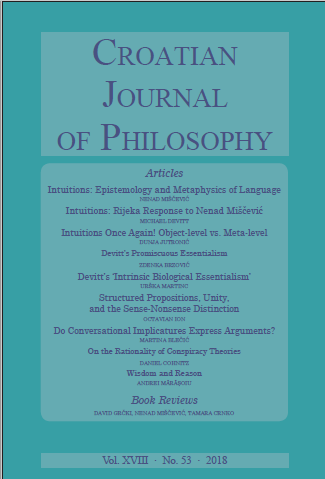Structured Propositions, Unity, and the Sense-Nonsense Distinction
Structured Propositions, Unity, and the Sense-Nonsense Distinction
Author(s): Octavian IonSubject(s): Logic, Philosophy of Language
Published by: KruZak
Keywords: Content; category mistake; nonsense; proposition; unity; state of affairs;
Summary/Abstract: Back in the Good Old Days of Logical Positivism, theories of meaning were part of a normative project that sought not merely to describe the features of language and its use, but so to speak to separate the wheat from the chaff. In this paper, I side with Herman Cappelen (2013) in thinking that we need to rethink and reintroduce the important distinction between sense and nonsense that was ditched along with other normative aspirations during Logical Positivism’s spectacular demise. Despite this, my delineation of the bounds of sense is different from Cappelen’s. One of my goals in the present paper is to argue that category mistakes are paradigmatic examples of nonsensical sentences. To this end I describe one candidate for what it might be that makes category mistakes nonsensical.
Journal: Croatian Journal of Philosophy
- Issue Year: XVIII/2018
- Issue No: 53
- Page Range: 319-334
- Page Count: 16
- Language: English
- Content File-PDF

